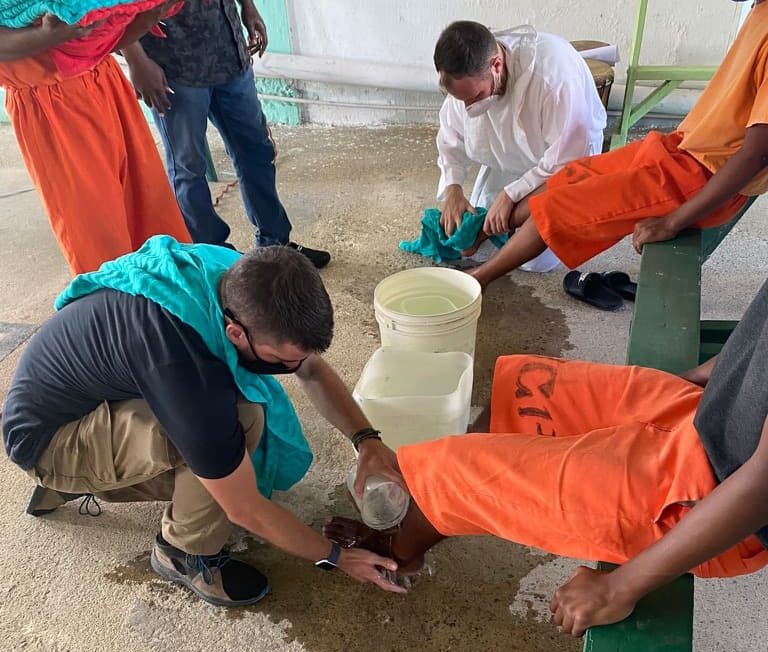I’ve been in prison for the last two-and-a-half years, and it’s been one of the most challenging and rewarding times of my life. No, I’ve not been incarcerated all this time. Rather, I minister to incarcerated people—I’m a prison chaplain to incarcerated youth at Wagner’s Youth Facility (WYF) in Belize Central Prison. This Lent, I think you should go to prison, too. Here are three reasons why I think you should consider taking up prison ministry.
For The Bible Told Me So
It’s wonderful when Jesus speaks clearly in the Gospels, and there are few passages more clear than the end of the 25th chapter of Matthew. In this passage, Jesus gives us the parable of the “judgment of the nations” in which he lays out the criteria for how people go to heaven.
That criteria are straightforward. The parable describes all the nations gathered before Christ for judgment. On his right are sheep and on his left are goats. Jesus welcomes the sheep into heaven because they gave Christ food when he was hungry, drink when he was thirsty, clothes when he was naked, welcome when he was a stranger, and they visited him when he was sick and imprisoned. They ask when they did all these things, and Jesus responds, “whatever you did for one of these least brothers of mine, you did for me.
Then Jesus turns to those on his left, and he tells them to depart from him, for they saw him hungry, thirsty, naked, a stranger, sick, and imprisoned and did nothing to relieve his suffering. These, too, are confused and ask Jesus when they saw him in such dire situations and did nothing. Jesus similarly responds to this question as he did before, “Whatever you did not do for one of these least brothers of mine, you did not do for me.”
As I said above, there are few places Jesus speaks so clearly: if you want to go to heaven, then you better feed the hungry, give drink to the thirsty, clothe the naked, welcome the stranger, and visit the sick and imprisoned. Many people have done all except that last one. The fact is going to prison is tough. They aren’t happy places, but joy can be found there. You might not be able to do much to change the circumstances of those who are incarcerated, but visiting them will change you. And that brings me to the second reason why you should go to prison.
It Will Change You
The poet Gerard Manley Hopkins wrote in his poem As Kingfishers Catch Fire, “for Christ plays in ten thousand places, / Lovely in limbs, and lovely in eyes not his / To the Father through the features of men’s faces.”
God loved humanity so much that he became one of us, and he left us the means to become a part of his own body. That’s not true for anyone of us individually–every person is invited to become a member of Christ’s mystical body. That is why we can truly say that when we serve the least of our brothers and sisters, we serve Christ himself.
Throughout the past couple of years, I know I’ve encountered Christ in the young men I serve in prison. More often than not, the face I’ve seen in these men is that of the Crucified Lord. They’ve shown me the scars of violence into which they were born. They voice their desire for change, renewal, and resurrection. I’ve heard them ask the same question that Christ did from the cross, “My God, my God, why have you forsaken me?” With gritty patience, they’ve born the darkness of the tomb of prison.
Yet, in the middle of the darkness of prison’s tomb, light breaks through. And it shines all the brighter for the darkness in which it shines. As I said above, prisons aren’t happy places, but joy is possible even there.
One way I invite joy into the lives of the young men I serve is by playing soccer with them. Sometimes, we play small-sided games, but my favorite is when we simply gather in a circle and try to keep a soccer ball up in the air. It’s a game with no winners. No show of dominance over the group is necessary. Rather, it’s a game in which the enjoyment is increased the more everyone is in on the action. In these brief moments, these young men can forget everything else except the joy of keeping a ball up in the air with their feet, knees, chest, and head. In these moments, I get to see the resurrection of lost childhood on these boys’ faces. Joy breaks through.
Prison ministry often feels like a series of small gestures that could never bend the iron bars of incarceration. During my time at Belize Central Prison, I’ve experienced a kind of hopelessness from confronting the fact that many of the young men I work with will spend their entire life going in and out of prison, and at least some of them will not live to see their 20s or 30s.
One thing that’s helped me get through these periods of hopelessness is remembering that small things make a big difference to incarcerated people. Just like a small cup of water could mean life or death to a man dying of dehydration, a prison minister’s small kindnesses could be the only good thing that happens in an incarcerated person’s day.
Even though I don’t feel like I’ve drastically changed anyone incarcerated person’s life, I do know that I’ve helped bring more happiness into many of their lives, and I think that matters. As Pope Francis writes in Evangelii Gaudium, “If I can help at least one person to have a better life, that already justifies the offering of my life. It is a wonderful thing to be God’s faithful people. We achieve fulfillment when we break down walls and our heart is filled with faces and names!”
There are scores of faces and names indelibly written on my heart. For the rest of my life, I will remember them. They’ve been the best teachers of what it means that all people are made in the image and likeness of God. And that brings me to my third reason you should go to prison.
You’ll See that We’re All Made in the Image and Likeness of God
My three reasons for doing prison ministry boil down to one reason: everyone on this planet is made in the image and likeness of God. Every saint and every sinner bears God’s likeness, and therefore every person’s dignity is inviolable. If we practice mindfulness of this fact, it will change how we interact with others.
One of the things I struggled with at the beginning of doing prison ministry, and even occasionally still, is holding two truths at the same time: the incarcerated person in front of me has done terrible things to other people—things they’ve openly shared with me, and God unconditionally loves that person and calls me to love them. My mission at Belize Central Prison is to remind people that they are worthy of love and attention, and I do that by trying to give them my full love and attention.
In giving my attention to these guys, my perceptions are transformed in the light of their essential goodness. I’m privileged to receive their stories of hardship and perseverance. And it reminds me that no person is defined by the worst thing they’ve ever done. Yet, incarcerated people are often told that they are, in fact, the worst thing they’ve ever done—that they can’t be forgiven. But that notion has nothing to do with the Christian faith. The first person Jesus assured of salvation was the man crucified next to him, and unlike Jesus, that man wasn’t innocent. Yet, Jesus says to him, “Amen, I say to you, today you will be with me in Paradise.”1
Every person I’ve ever spoken with at the prison experienced a tragedy at some pivotal moment in their life. Every one of them was denied love and affection from a mom, a dad, their grandparents, an uncle, or someone else who they should have been able to depend on. I’ve come to learn in my prison ministry that every human tragedy stems from a person being denied real love at some fundamental point in their life. That’s what Jesus is trying to counter in his requirements to get to heaven.
The core message of Jesus’s parable in Matthew 25 is that all people deserve to be seen, to be listened to. Every person deserves to hear the words, “You matter; You are loved,” and to experience the truth not only in words but in actions. Matthew 25 is about affirming the dignity of those who feel lost, forgotten, thrown out, and abandoned.
Jesus calls us to do the work of reminding people of their essential dignity. This Lent, go to prison and get to work.
———
If you’re interested in doing prison ministry, visit the directory on the Catholic Prison Ministries Coalition website. There, you can search by state and diocese for organizations that you can join to start doing prison ministry. You’ll be grateful you did!
- Luke 23: 43 ↩


